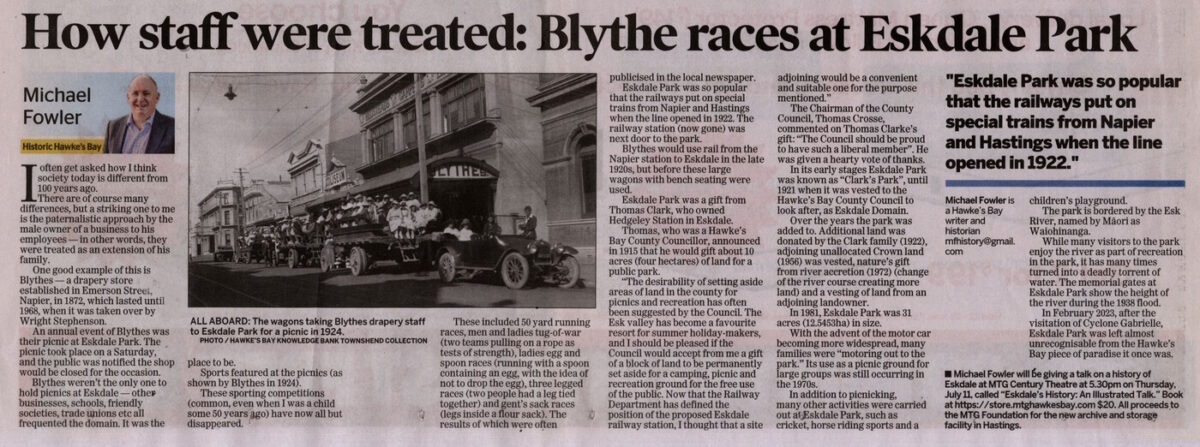How staff were treated: Blythe races at Eskdale Park
Michael Fowler
Historic Hawkes Bay
I often get asked how I think society today is different from 100 years ago.
There are of course many differences, but a striking one to me is the paternalistic approach by the male owner of a business to his employees – in other words, they were treated as an extension of his family.
One good example of this is Blythes – a drapery store established in Emerson Street, Napier, in 1872, which lasted until 1968, when it was taken over by Wright Stephenson.
An annual event of Blythes was their picnic at Eskdale Park. The picnic took place on a Saturday, and the public was notified the shop would be closed for the occasion.
Blythes weren’t the only one to hold picnics at Eskdale – other businesses, schools, friendly societies, trade unions etc all frequented the domain. It was the place to be.
Sports featured at the picnics (as shown by Blythes in 1924).
These sporting competitions (common, even when I was a child some 50 years ago) have now all but disappeared.
These included 50 yard running races, men and ladies tug-of-war (two teams pulling on a rope as tests of strength), ladies egg and spoon races (running with a spoon containing an egg, with the idea of not to drop the egg), three legged races (two people had a leg tied together) and gent’s sack races (legs inside a flour sack). The results of which were often publicised in the local newspaper.
Eskdale Park was so popular that the railways put on special trains from Napier and Hastings when the line opened in 1922. The railway station (now gone) was next door to the park.
Blythes would use rail from the Napier station to Eskdale in the late 1920s, but before these large wagons with bench seating were used.
Eskdale Park was a gift from Thomas Clark, who owned Hedgeley Station in Eskdale.
Thomas, who was a Hawke’s Bay County Councillor, announced in 1915 that he would gift about 10 acres (four hectares) of land for a public park.
“The desirability of setting aside areas of land in the county for picnics and recreation has often been suggested by the Council. The Esk valley has become a favourite resort for summer holiday-makers, and I should be pleased if the Council would accept from me a gift of a block of land to be permanently set aside for a camping, picnic and recreation ground for the free use of the public. Now that the Railway Department has defined the position of the proposed Eskdale railway station, I thought that a site adjoining would be a convenient and suitable one for the purpose mentioned.”
The Chairman of the County Council, Thomas Crosse, commented on Thomas Clarke’s [Clark’s] gift: “The Council should be proud to have such a liberal member”. He was given a hearty vote of thanks.
In its early stages Eskdale Park was known as “Clark’s Park”, until 1921 when it was vested to the Hawke’s Bay County Council to look after, as Eskdale Domain.
Over the years the park was added to. Additional land was donated by the Clark family (1922), adjoining unallocated Crown land (1956) was vested, nature’s gift from river accretion (1972) (change of the river course creating more land) and a vesting of land from an adjoining landowner.
In 1981, Eskdale Park was 31 acres (12.5453ha) in size.
With the advent of the motor car becoming more widespread, many families were “motoring out to the park.” Its use as a picnic ground for large groups was still occurring in the 1970s.
In addition to picnicking, many other activities were carried out at Eskdale Park, such as cricket, horse riding sports and a children’s playground.
“Eskdale Park was so popular that the railways put on special trains from Napier and Hastings when the line opened in 1922.”
The park is bordered by the Esk River, named by Maori as Waiohinanga.
While many visitors to the park enjoy the river as part of recreation in the park, it has many times turned into a deadly torrent of water. The memorial gates at Eskdale Park show the height of the river during the 1938 flood.
In February 2023, after the visitation of Cyclone Gabrielle, Eskdale Park was left almost unrecognisable from the Hawke’s Bay piece of paradise it once was.
Michael Fowler is a Hawke’s Bay writer and historian
[email protected]
Michael Fowler will be giving a talk on a history of Eskdale at MTG Century Theatre at 5.30pm on Thursday, July 11, called “Eskdale’s History: An Illustrated Talk.” Book at [https]://store.mtghawkesbay.com $20. All proceeds to the MTF Foundation for the new archive and storage facility in Hastings.
Photo caption – “ALL ABOARD: The wagons taking Blythes drapery staff to Eskdale Park for a picnic in 1924.
PHOTO / HAWKE’S BAY KNOWLEDGE BANK TOWNSHEND COLLECTION












Do you know something about this record?
Please note we cannot verify the accuracy of any information posted by the community.